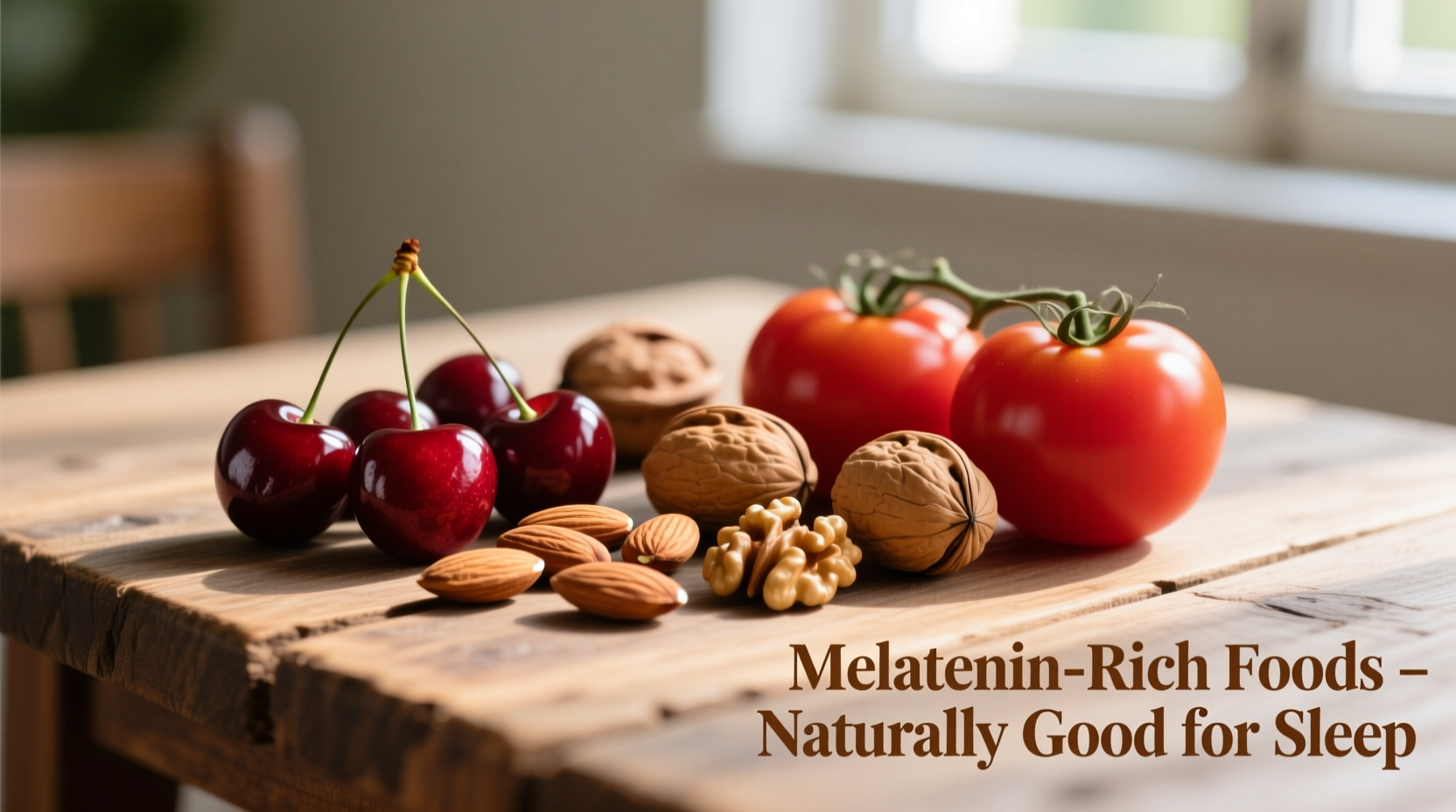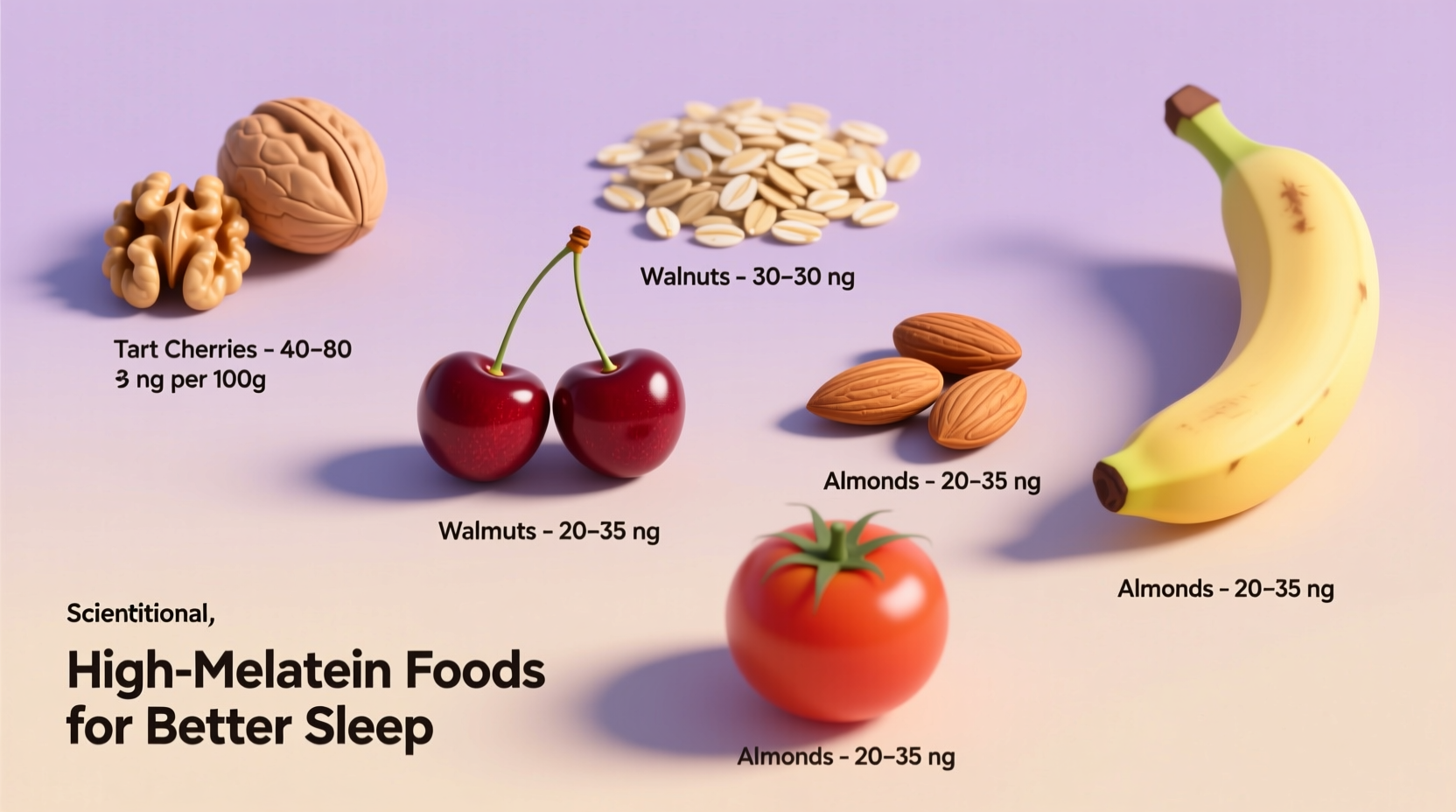Why Food Sources of Melatonin Matter for Better Sleep
When you're searching for natural ways to improve sleep quality, understanding which foods are high in melatonin gives you a powerful dietary tool. Unlike supplements that deliver concentrated doses, food-based melatonin comes packaged with complementary nutrients that enhance absorption and effectiveness. Research shows dietary melatonin works synergistically with other compounds in whole foods, potentially providing more balanced circadian rhythm support than isolated supplements.
Natural food sources offer a gentler approach to sleep regulation, avoiding the potential morning grogginess sometimes associated with melatonin supplements. The key is knowing which foods contain significant amounts and how to incorporate them strategically into your evening routine.
Top 7 Foods Highest in Melatonin (With Scientific Measurements)
| Food | Melatonin Content (ng/g) | Typical Serving Size | Estimated Melatonin per Serving |
|---|---|---|---|
| Tart cherries (Montmorency) | 13-30 | 1 cup juice or 100g fresh | 13-30 ng |
| Walnuts | 3.5 | 1 ounce (14 halves) | 3.5 ng |
| Almonds | 3.9 | 1 ounce (23 nuts) | 3.9 ng |
| Tomatoes | 3.0-10.0 | 1 medium tomato | 3-10 ng |
| Olives (black) | 2.0-5.0 | 10 olives | 2-5 ng |
| Corn | 1.5-4.0 | 1/2 cup cooked | 1.5-4 ng |
| Rice (white, cooked) | 0.5-2.0 | 1/2 cup cooked | 0.5-2 ng |
Data sourced from the National Institutes of Health's comprehensive review of melatonin in foods (2017) and Food Chemistry journal analysis (2018).

How Dietary Melatonin Actually Works
Many people don't realize that the melatonin in foods functions differently than supplements. When you consume melatonin-rich foods, you're getting not just the hormone itself but also supporting compounds that enhance its effectiveness:
- Tart cherries contain anthocyanins that boost melatonin absorption while providing anti-inflammatory benefits
- Nuts deliver healthy fats that improve melatonin's bioavailability
- Tomatoes provide lycopene which works synergistically with melatonin
A study published in the European Journal of Nutrition found that participants who consumed tart cherry juice concentrate experienced significantly increased urinary melatonin levels and improved sleep duration compared to the placebo group. The researchers noted that the food matrix effect made the dietary melatonin more effective than expected based on concentration alone.
Practical Ways to Incorporate Melatonin-Rich Foods
Knowing which foods are high in melatonin is only half the battle - timing and preparation matter significantly for maximum benefit:
Optimal Evening Meal Planning
For sleep-supporting benefits, consume melatonin-rich foods 2-3 hours before bedtime. This timing aligns with your body's natural melatonin production cycle. Try these evidence-based strategies:
- Cherry advantage: Drink 8 ounces of pure tart cherry juice (not sweetened cocktail) in the evening
- Nut timing: Enjoy a small handful of walnuts or almonds as an evening snack with a piece of fruit
- Tomato transformation: Choose cooked tomatoes over raw - heating increases melatonin bioavailability by breaking down cell walls
- Grain selection: Opt for white rice over brown in evening meals as it contains higher melatonin levels
Avoid These Common Mistakes
Many people undermine their efforts to increase dietary melatonin through these preventable errors:
- Consuming melatonin foods too close to bedtime (digestion competes with sleep processes)
- Choosing sweetened cherry products that negate benefits with sugar spikes
- Overlooking food combinations that enhance absorption (pair with vitamin C-rich foods)
- Expecting immediate results - dietary changes require consistent implementation
Realistic Expectations: Food vs. Supplements
While foods high in melatonin offer valuable sleep support, it's important to understand their limitations compared to supplements:
- Foods provide significantly lower doses (typically 1-30 ng per serving) versus supplements (1-10 mg, or 1,000,000-10,000,000 ng)
- Food-based melatonin works gradually through consistent dietary patterns rather than immediate effects
- The complementary nutrients in whole foods create a more balanced physiological response
For most people, incorporating these foods represents an excellent first-line approach before considering supplements. As noted by sleep researchers at Johns Hopkins Medicine, "Dietary approaches to sleep improvement work best when implemented consistently as part of a broader healthy lifestyle."
When to Consider Professional Guidance
While adding melatonin-rich foods to your diet is generally safe, consult a healthcare provider if:
- You're taking blood thinners (walnuts and cherries have mild anticoagulant properties)
- You have autoimmune conditions (melatonin can affect immune function)
- You're pregnant or breastfeeding
- You're already taking melatonin supplements
Remember that food sources of melatonin work best as part of a comprehensive sleep hygiene strategy that includes consistent sleep schedules, proper light exposure, and stress management techniques.











 浙公网安备
33010002000092号
浙公网安备
33010002000092号 浙B2-20120091-4
浙B2-20120091-4